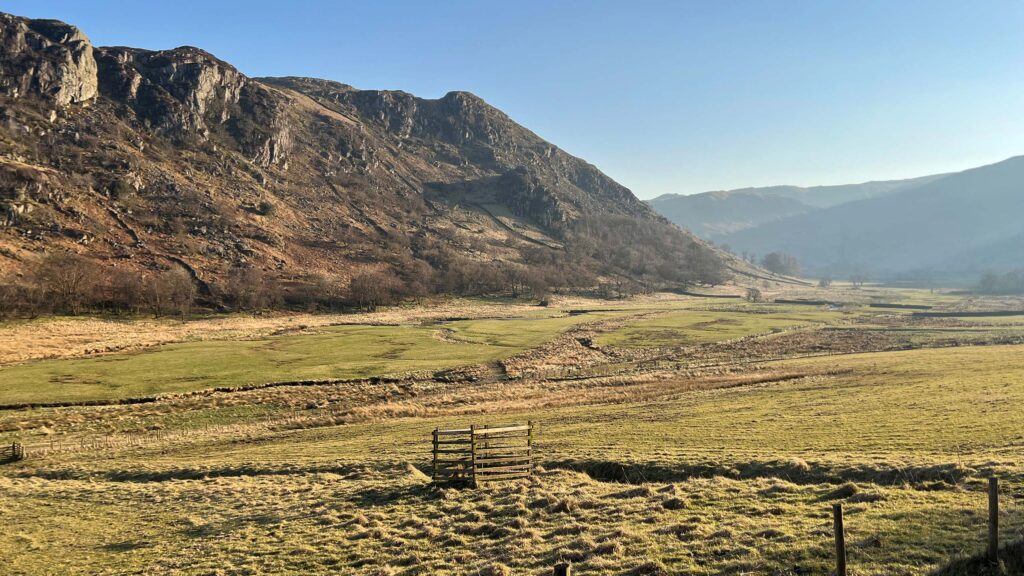Dismay at RSPB decision to remove sheep from upland farms
 The Swindale valley © Magnus Mcintosh
The Swindale valley © Magnus Mcintosh Residents and farming supporters in the Swindale valley on the eastern edge of the Lake District have voiced their dismay at the decision to remove sheep from two RSPB tenanted farms.
Since 2012, the RSPB has leased the two properties, Naddle Farm and Swindale Farm, from landowner United Utilities.
The decision has now been taken to destock the sheep and replace them with 30 native cattle and Lakeland Fell ponies.
See also: Uncertain future for upland farms as Budget looms
The reserve and conservation activity is managed by the RSPB and encompasses 3,000ha of woodland, moorland, farmland, river and meadow, set within the mountainous landscape on the eastern edge of the Lake District National Park.
The charity says it is focused on delivering a range of societal benefits including nature recovery, clean drinking water and carbon sequestration, doing this through a mix of traditional farming practices alongside modern land management techniques.
Changes to what it calls “past unsustainable grazing practices” are key to achieving these aims, the RSPB says.
Farmer concerns
Farmers and local residents alike, however, have major concerns about the wider impact of forced sheep removal.
Viv Lewis, from the Federation of Cumbria Commoners, says the persistent clearance of sheep was in part due to the effects of foot-and-mouth in 2001.
But stocking rate reductions required by Natural England for agri-environment schemes, and by landowners changing their land management policies to take advantage of government subsidies, have driven it further.
“It has accelerated since the RSPB took on the tenancy of Swindale and Naddle farms from United Utilities and removed virtually all the sheep from these farms,” she says.
Local residents do see merit in some of the conservation work taking place, and the area is still popular with tourists, but changes to how the land will be managed leave them questioning the future of farming in the area.
Local resident and farming supporter Mark Blythe says: “Removing the sheep from Swindale is going to have devastating consequences for the land. It’s going to be an overgrown, unkempt swamp that nobody will want to visit.”
He estimates the area has lost more than half of its farms in the past 10 years and, with the two RSPB farms now also removing their sheep, the consequences for hefted sheep and the breeding stock could be severe.
“Once flocks are removed, their ancient hefts are lost forever. This, in turn, undermines the upland’s farming viability,” says Mr Blythe.
“The wisdom of the farming families will be gone, and it will also impact the heft of the sheep. That, in turn, will have wider consequences for breeding stock and the national ovine gene pool.
“What’s happening now isn’t conservation – it’s what I can only describe as the second Highland clearance.”
RSPB response
The RSPB, however, believes that making a transition from sheep to larger herbivores such as cattle and ponies will be better for nature restoration.
The landscape, it says, is marginal land and not primarily farmed for food production. Transitioning from in-bye sheep grazing at Swindale to a more diverse grazing system will allow the RSPB to restore habitats, improve water quality and build climate resilience.
Similar practices elsewhere have already led to ecological recovery, it claims, with habitats restored and the return of lost species.
An RSPB spokesman says: “Like many farmers in the Lake District, we are adapting to new challenges and ensuring a sustainable future for both farming and nature.
“It was neither ecologically nor economically viable to continue the practice of sheep farming at Swindale. We will, however, be keeping a flock of 200 sheep on one of the commons.”
No understanding of sheep farming
Mr Blythe is not convinced. “As usual, the RSPB has no understanding of sheep farming and the fell more widely,” he says.
“The rough fell sheep from the uplands are crucial breeding stock for lowland sheep farms which do, in turn, produce the meat for domestic and export markets.
“How can 30 cattle on 3,000ha be anything other than cosmetic to secure the grants? Once the land is left fallow and overgrown, the area will rely totally on the public purse for stewardship as the farmers will be long gone.”
Ms Lewis also questions how a few cattle and ponies can sustain a farming family, let alone 20 jobs.
“These jobs will be funded by grants and government subsidies, and inevitably short term. What happens when the grants and subsidy end?” she asks.
